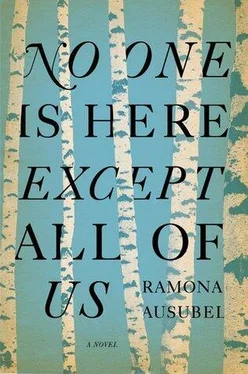Sincerely, I
In the morning, as Francesco was going to get his pastry and coffee, a small boat pulled up to the dock, and out of it came two soldiers, older and full-cheeked, no one Francesco knew. They wore Italian uniforms, and as they approached, they drew their hats down to their hearts. Francesco thought, They have come to take my friend. Solemnly, he met them on the wooden-planked dock. “There have been some losses,” the older of the two men said. “Giuseppe Carbone.” The face coalesced in Francesco’s mind. A younger boy, thorny and uneven, commanding a game of tag on the beach. “And Bianco,” the man said.
“But that’s me,” Francesco objected, instinct prompting him to check his own hands to see that he was alive.
“Luca Bianco.” Francesco’s oldest brother, so confident the air swirled around him, drawing everyone nearer, so much what the world had dreamed a son could be.
“He can’t die,” Francesco said, sure of this. Like that part of the contract had been renegotiated, this man too good for the world to lose.
“We’re very sorry for your loss,” the younger of the two soldiers said. “It was an ambush, in Rome. They were both brave.”
The soldiers saluted, and then they turned around and left.
For a moment, the tears in Francesco’s eyes were made of relief and thanks. Francesco had been granted a pardon. No one wanted to take Igor from him, not yet. And then, Francesco saw Luca’s shadow collapse at his feet. He, the ever-disappointing son, would have to walk this news to his mother’s doorstep, he would have to be the one to throw her heaving to the floor with it. Francesco sat down on the dock and put his head in his hands, and for a long time, nothing breathed. God was benevolent and he was cruel.
THE BOOK OF THE DISTANCE AND THE FUTURE, WHICH IS NOW
The mountains, deep green and fully alive, were high around my bony children and me. We did not ascend or descend, but walked straight across the low valley of this revolving earth. On the coldest nights we slept in barns, if we found them, with the pigs and goats. The animals did not seem to feel heroic, sharing their house with refugees. They moaned and grunted and grudgingly allowed us a little corner. We whispered about our own barn and how well we had made it into a place to pray. We sneaked eggs and animal feed, chewed on the same hay the pigs slept on, but as soon as the idea of light peeked through the cracks in the walls, we left to let the new day shake us, tackle us, wring us out.
On a clear and blue afternoon in which the branches on the trees were naked but not shy for it, we came to a spectacular and strange thing — a mattress in the middle of a cleared field. The grass was dry and cut short, whatever it had been grown for gone into cooking pots and bellies. But there was this old and moldy thing, a thing once slept on by people, loved on by people. It had grass growing through it. It was a nest for new baby grasses. For this family, who had survived on whatever was found, this seemed like a gift. Solomon, slow, weak and broken-in, did not lie down but began to jump.
He was a beautiful, enthusiastic jumper. He used his whole body to propel himself upward. When he came down, the springs of his legs sent him up again. The good ground, hanging on to his ankles, did not stand a chance against all that sky.
I held the baby on my lap so we could be bounced by Solomon’s jumping. The baby laughed, a sharp and definite laugh. Maybe his first. “How long since we laughed?” I asked. We tried to keep quiet, because we never knew who was going to steal us away just for existing, but in this moment it was not easy. In this moment Solomon’s muscles began to ache from his laughter. I collapsed in my own joy, watched my son go up and down, his hair bouncing, his arms flapping, flightless.
“What are you?” I called to Solomon.
“A boy!” Solomon called back.
“No, you are jumping!” I laughed.
“I am both!” Solomon shrieked, dizzy.
I lay down in the grass beside the mattress. I put my head on a rock and covered my eyes with my hands. The sun was lost light. The sound of my shrieking and laughing boy was unmuffled. I listened to every beat of it, every landing and takeoff, every collapse and resolution to continue. Solomon slowed down, said, “I see the stars,” then collapsed on the mattress in dry heaves. He had nothing to vomit up.
My hand ran the ridge of Solomon’s spine. It hurt to cry — I had no water to spare, but my eyes had waited long enough. Solomon tried to stand, but it was too much. His legs were soft and bendy. Beaten, he lay down and wept. I told him the story of the very day we were in — once upon a time we were a family who came upon an amazing mattress in a field just like every other field and how the older brother had jumped so high he saw the stars while his mother and brother listened to the sound of his laughter with the sun on their faces.
“Don’t you remember how wonderful?” I asked.
He repeated just the last word, but it collapsed on his tongue.
The sun stopped being worth shading ourselves from. The cut field was a pincushion of interrupted growth. The baby fell asleep on the bed, and Solomon lay next to him. I went to find food and came back with a rabbit, a baby, already dead but undiscovered by birds. I skinned it, put it on a small fire and waited for the smell to wake my baby up.
We tried to sleep on the bed, all of us, but I could feel Solomon turning back and forth, awake. The stars were hidden behind a cover of gray — even though I knew the stars were there still, arranged and held, I could not believe it was true. There seemed to be another world over me, a flat gray place, just as hard and true as this one. A world where you could walk for months having no idea where you were, then walk some more.
I woke up when Solomon started to jump around me. Dawn was a luminous bruise on the horizon, the rest of the sky dark. I felt the surface under me go soft and shifty. I felt the spring of his feet against it, their insistence on high and higher.
I started to gather the baby into my arms, and at the first touch I understood that he was not going to wake up. He was cold, and he was still.
“Stop,” I said, “stop jumping.”
“We are boys,” he whispered to himself, “two boys. We are jumping.”
I took the baby into my arms. In the dark, only his shining eyes were easy to see. I laid him on the bed. I listened for his breath. I listened for his heart. On the mattress, the grass-sprung mattress, here in this field after one harvest and before another, the baby’s little spirit was caught on the wind and carried absolutely everywhere.
“This is my baby who is lost,” I kept whispering. I remember saying that so many times it turned into one word.
I opened my dress to put the baby onto my long-dry breast. “What if this?” I said. “What if you are new?” Solomon opened his shirt too and tried to offer the breast that he had never had, not even for a moment of his short life.
“What if this?” he echoed. We held the boy together against us while he did not drink. I wondered how long he had been waiting to slip away. How hard he had tried to hold on. “All right,” I whispered, further than I wished from forgiving him. “You chose to go.”
“My brother who is lost. I bless him. May His great Name be exalted and sanctified in the world that He created as He willed.” The prayer split me, the way only the sight of blood makes a wound begin to sear with pain. Years from now, a thousand or more, I might be ready to dress in black and mourn. For as long as I could imagine, for the whole crooked duration of my life, I tasted the metallic desire for misery in my entire body.
Читать дальше












